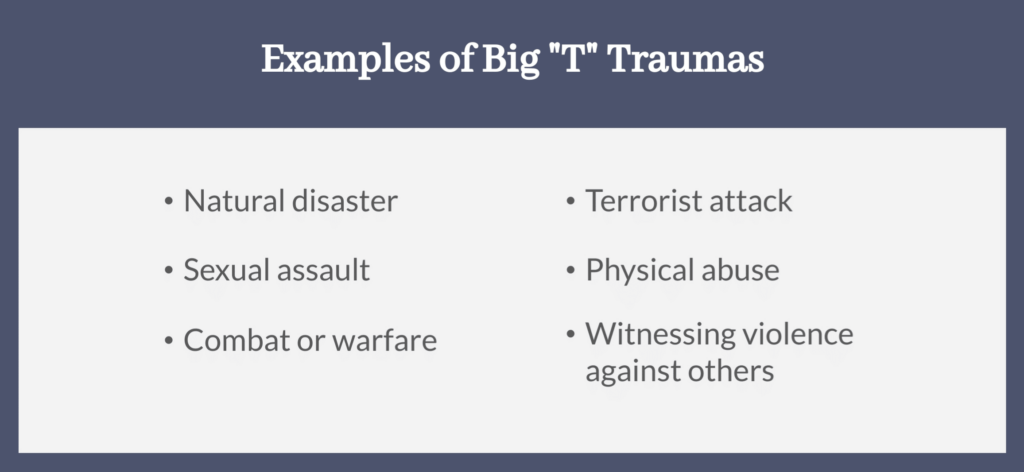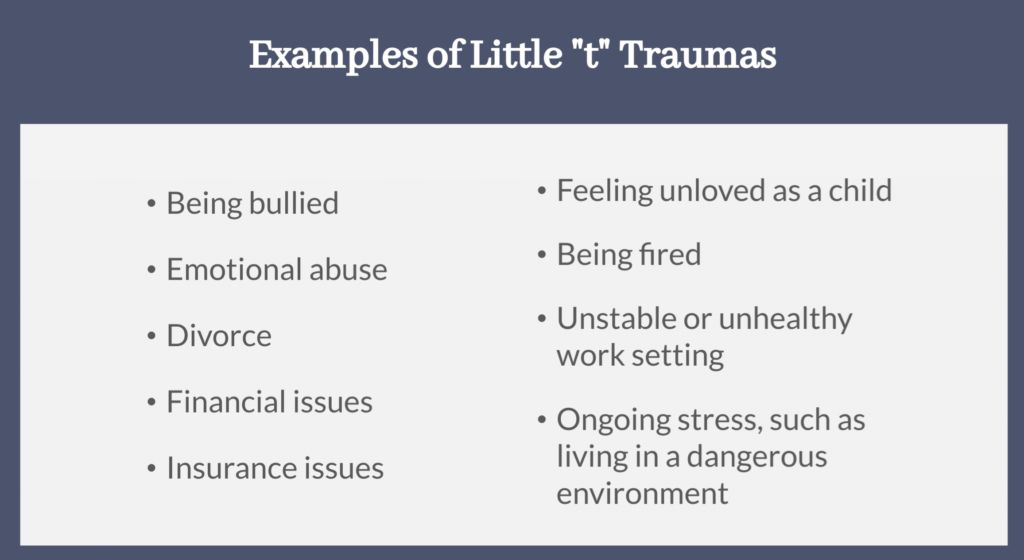By Wesley Gallagher
Trauma is usually talked about in terms of big, life-altering events: the sudden death of a loved one, a natural disaster, a violent assault. In reality, trauma comes in all shapes and sizes, and while these big events are indeed traumatic, little events can be traumatic, too.
Big “T” vs. Little “t” Trauma
The experiences listed above fall under the category of big “T” trauma: a singular event that is catastrophic, life-threatening, or intensely distressing. It is also referred to as acute trauma.

Little “t” trauma, on the other hand, doesn’t threaten your safety or drastically alter your life, but it is distressing enough that it causes a disruption in emotional functioning. Events that fall under this category of trauma may be brushed off as normal experiences that shouldn’t cause traumatic stress, which can lead to avoidance of processing it properly or downplaying how distressing the event actually was. Unfortunately, this type of avoidance can serve to exacerbate trauma-related symptoms, leading to maladaptive coping mechanisms and emotional issues.

While one occurrence of such little “t” traumas might not cause significant distress, the compounding nature of repeated small traumas can be just as distressing as one big “T” trauma. This accumulation of traumas is sometimes known as chronic or complex trauma.
Effects of Little “t” Trauma
According to the Substance Abuse and Mental Health Services Administration (SAMHSA), responses to trauma vary from person to person. While many people recover from trauma with no lasting effects, others may suffer from long-term mental, emotional, and physical issues.
The characteristics of the person, characteristics of the event(s), developmental processes, the meaning of the event, and sociocultural factors all play a part in whether a person experiences ongoing emotional trauma. Unaddressed trauma, especially in childhood or repeated, ongoing trauma, is an underlying cause of many mental, behavioral, and addiction issues.
You’ve likely heard of post-traumatic stress disorder (PTSD), which is one of the most talked about effects of trauma, often associated with big “T” trauma. But according to The Meadows Clinical Director Bre Mylius, all trauma impacts the brain, and PTSD is not the only way we can be impacted by trauma.
“Most people on the planet have trauma,” says Mylius. “Sometimes it’s very small trauma — what they call little ‘t’ trauma — that over time compounds to equal one big trauma. I call that crazy-making trauma.”
Because little “t” trauma isn’t a single event you can point to, it can easily go unnoticed or ignored.
Because little “t” trauma isn’t a single event you can point to, it can easily go unnoticed or ignored. Meanwhile this repeated trauma adds up to affect how you see yourself and others, and how your brain is wired to respond to the world. Your survival systems remain on high alert, and you’re hypervigilant, but you can’t pinpoint why. You can see the effects, but you can’t tell what the cause is. Hence the crazy-making part.
In fact, many of the patients Mylius sees are unaware that they have experienced any trauma until they start to dive into that person’s past together.
“Throughout their lives, it’s just a ton of tiny things that keep happening,” she says. “It’s the small, repeated trauma that keeps happening, that has changed how they cope with things, because of that small repeated trauma.” It can take someone else pointing out this trauma for you to start to realize the impact it has had on you.
Healing from Trauma
Fortunately, it’s never too late to deal with trauma, big or small, and the best way to do this is with someone who is trained to find and treat trauma and its effects. Here at The Meadows, we use research-based, time-tested practices to get to the root of trauma and its impact on your behavioral, mental, and emotional health. We offer a safe, supportive environment for you to heal from trauma, no matter how small. Reach out today to learn more.



